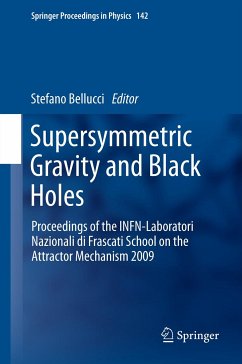
Quantum Aspects of Black Holes (eBook, PDF)
Versandkostenfrei!
Sofort per Download lieferbar
40,95 €
inkl. MwSt.
Weitere Ausgaben:

PAYBACK Punkte
20 °P sammeln!
Beginning with an overview of the theory of black holes by the editor, this book presents a collection of ten chapters by leading physicists dealing with the variety of quantum mechanical and quantum gravitational effects pertinent to black holes. The contributions address topics such as Hawking radiation, the thermodynamics of black holes, the information paradox and firewalls, Monsters, primordial black holes, self-gravitating Bose-Einstein condensates, the formation of small black holes in high energetic collisions of particles, minimal length effects in black holes and small black holes at...
Beginning with an overview of the theory of black holes by the editor, this book presents a collection of ten chapters by leading physicists dealing with the variety of quantum mechanical and quantum gravitational effects pertinent to black holes. The contributions address topics such as Hawking radiation, the thermodynamics of black holes, the information paradox and firewalls, Monsters, primordial black holes, self-gravitating Bose-Einstein condensates, the formation of small black holes in high energetic collisions of particles, minimal length effects in black holes and small black holes at the Large Hadron Collider. Viewed as a whole the collection provides stimulating reading for researchers and graduate students seeking a summary of the quantum features of black holes.
Dieser Download kann aus rechtlichen Gründen nur mit Rechnungsadresse in A, B, BG, CY, CZ, D, DK, EW, E, FIN, F, GR, HR, H, IRL, I, LT, L, LR, M, NL, PL, P, R, S, SLO, SK ausgeliefert werden.













